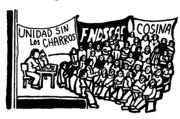.gif)
Charro (Mexican politics)
Encyclopedia

Politics of Mexico
The politics of Mexico take place in a framework of a federal presidential representative democratic republic whose government is based on a congressional system, whereby the president of Mexico is both head of state and head of government, and of a multi-party system...
and labor
Labour economics
Labor economics seeks to understand the functioning and dynamics of the market for labor. Labor markets function through the interaction of workers and employers...
, a charro or líder charro ("charro leader") is a government-appointed union
Trade union
A trade union, trades union or labor union is an organization of workers that have banded together to achieve common goals such as better working conditions. The trade union, through its leadership, bargains with the employer on behalf of union members and negotiates labour contracts with...
boss.
Mexico has a long tradition of government control and cooptation of unions and their leaders. Following the Mexican Revolution
Mexican Revolution
The Mexican Revolution was a major armed struggle that started in 1910, with an uprising led by Francisco I. Madero against longtime autocrat Porfirio Díaz. The Revolution was characterized by several socialist, liberal, anarchist, populist, and agrarianist movements. Over time the Revolution...
, the coalition of generals leading the nation under the auspices of the jefe máximo Plutarco Elías Calles
Plutarco Elías Calles
Plutarco Elías Calles was a Mexican general and politician. He was president of Mexico from 1924 to 1928, but he continued to be the de facto ruler from 1928–1935, a period known as the maximato...
that eventually became the Institutional Revolutionary Party
Institutional Revolutionary Party
The Institutional Revolutionary Party is a Mexican political party that held power in the country—under a succession of names—for more than 70 years. The PRI is a member of the Socialist International, as is the rival Party of the Democratic Revolution , making Mexico one of the few...
(PRI) sought to keep the often fractious labor movement under control, and did so by repressing leaders and movements outside the dominant party. Following the "social revolution" of the Cárdenas
Lázaro Cárdenas
Lázaro Cárdenas del Río was President of Mexico from 1934 to 1940.-Early life:Lázaro Cárdenas was born on May 21, 1895 in a lower-middle class family in the village of Jiquilpan, Michoacán. He supported his family from age 16 after the death of his father...
years, the government sought to centralize power in the federal government, replacing local union bosses, who had earned the nickname pistoleros ("gunmen") through their strongarm policies, with college-educated professionals. Under Cárdenas, the Confederation of Mexican Workers (CTM), an umbrella of PRI-affiliated unions, became the instrument of PRI domination of labor. But the direct appointment of union bosses was not institutionalized until the administration of Miguel Alemán Valdés
Miguel Alemán Valdés
Miguel Alemán Valdés served as the President of Mexico from 1946 to 1952.-Life:Alemán was born in Sayula in the state of Veracruz as the son of General Miguel Alemán González and Tomasa Valdés Ledezma...
, when in the resolution of a dispute within the independent railroad workers' union, the president
President of Mexico
The President of the United Mexican States is the head of state and government of Mexico. Under the Constitution, the president is also the Supreme Commander of the Mexican armed forces...
pushed for a contract that allowed management greater control over the union. Following the resolution, Alemán appointed "loyal" leaders to the petroleum workers' and miners' unions.
The appointed leaders were called charro
Charro
Charro is a term referring to a traditional horseman from Mexico, originating in the central-western regions primarily in the state of Jalisco including: Zacatecas, Durango, Guanajuato, Morelos, Puebla...
s in derision by the members of the newly-usurped unions in reference to Jesús Díaz de León, a leader of the railroad workers' union who was known as "El Charro" for attending union functions in the elaborate regalia of the charro, Mexico's traditional cowboy. Díaz de León gained control of the union by means of an interior coup supported by the CTM and President Alemán. In October of 1948, he falsely accused his predecessor of misappropriating of union funds to finance his bid for the presidency of the CTM and following the failure of that bid, the establishment of the independent union. The attorney general's investigation led to Díaz de León's ouster from the union presidency, but he was restored by agents of the federal government, who arrested his rival Luis Gómez Z. Díaz de León proceeded to alter union bylaws to deny voting rights to the rank-and-file. He also withdrew the union from the independent coalition.
The struggle against charrismo took on the title of "union democracy", and remains a vital part of the fight for democracy and social justice in Mexico today.

